SFUSD Sanctuary Response Protocols
Link to this section
Download the SFUSD Sanctuary Response Protocols flier in English, Spanish, Chinese, Tagalog, Vietnamese, Arabic, and Samoan.
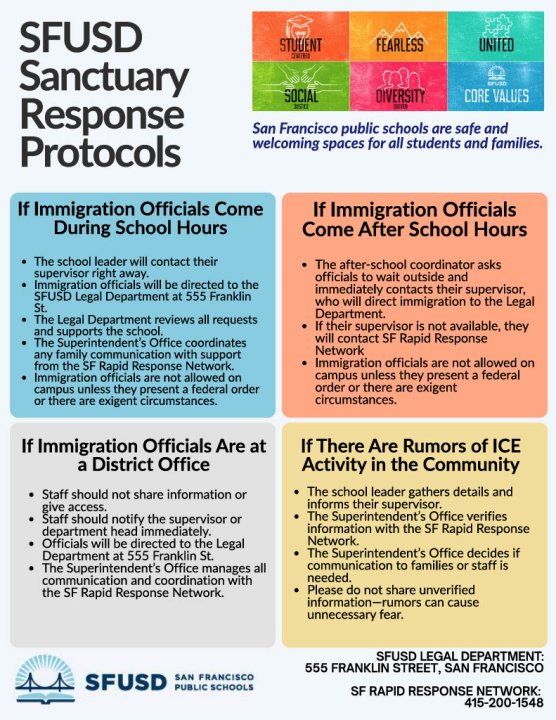
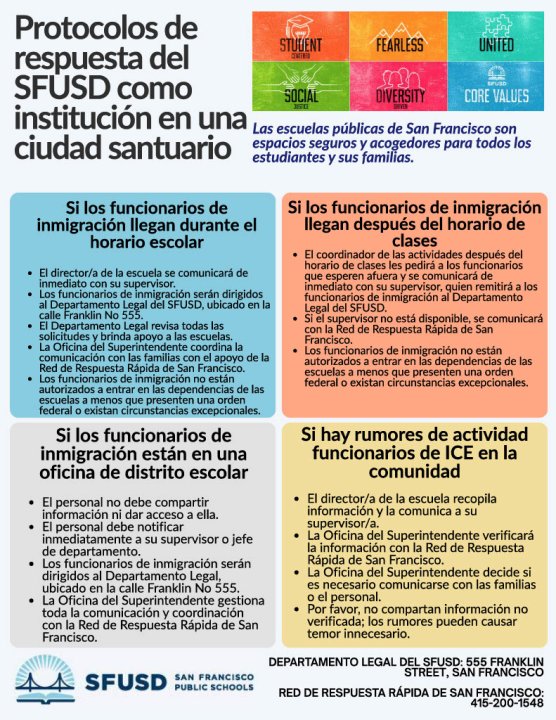
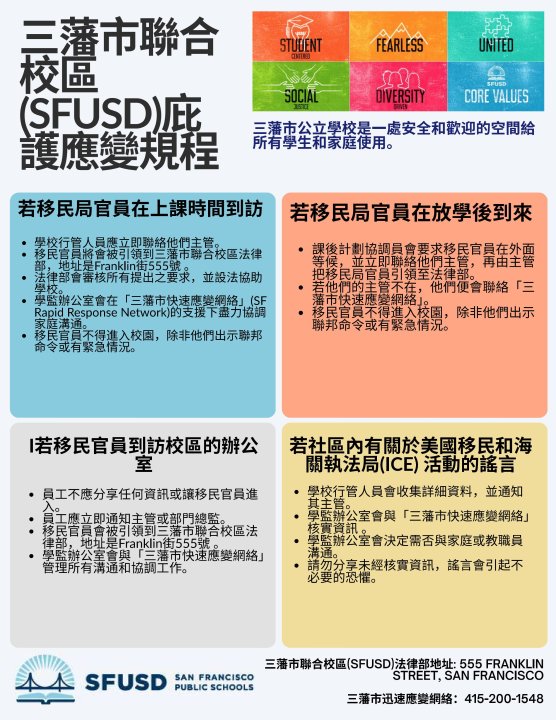
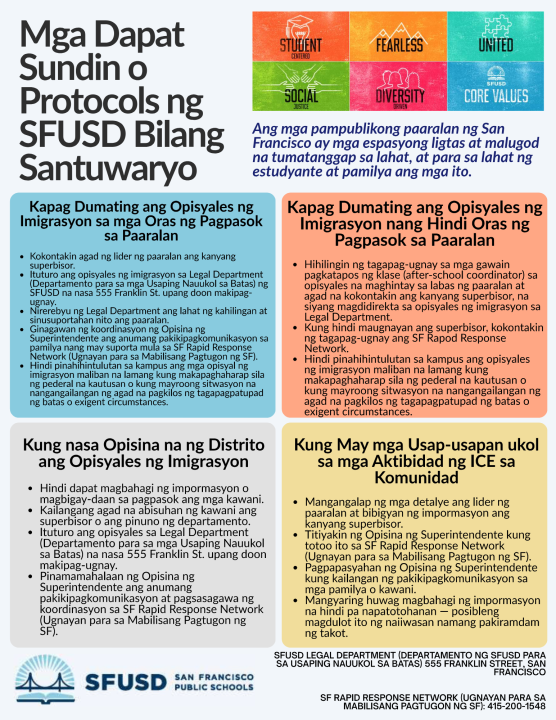
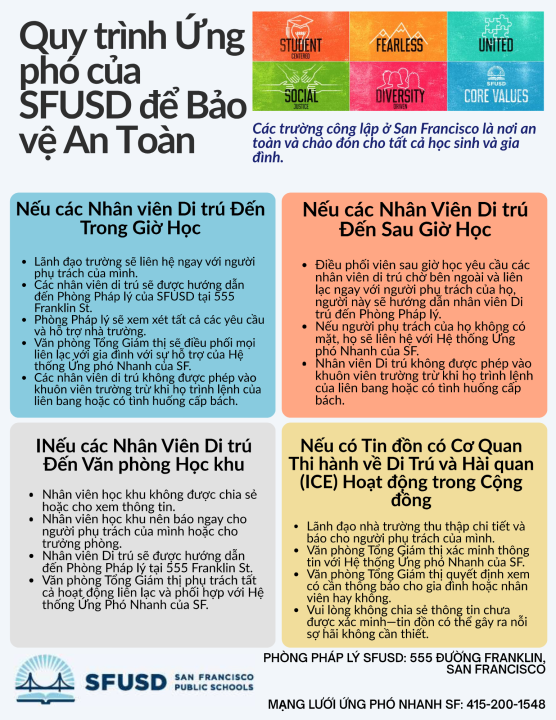
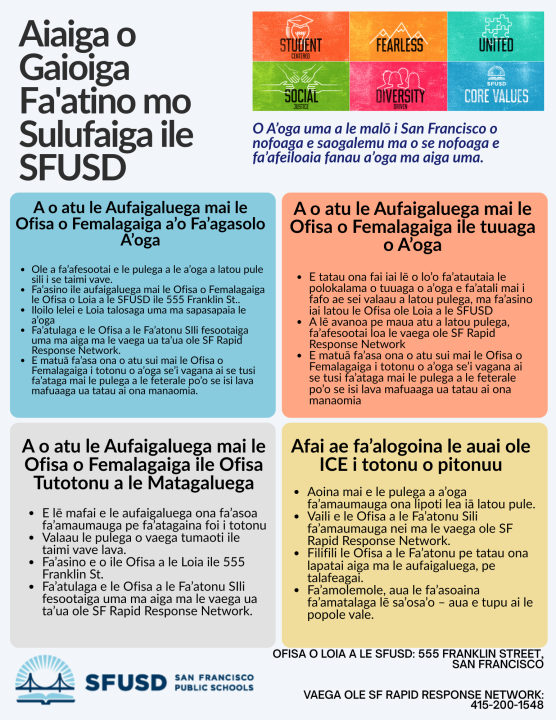
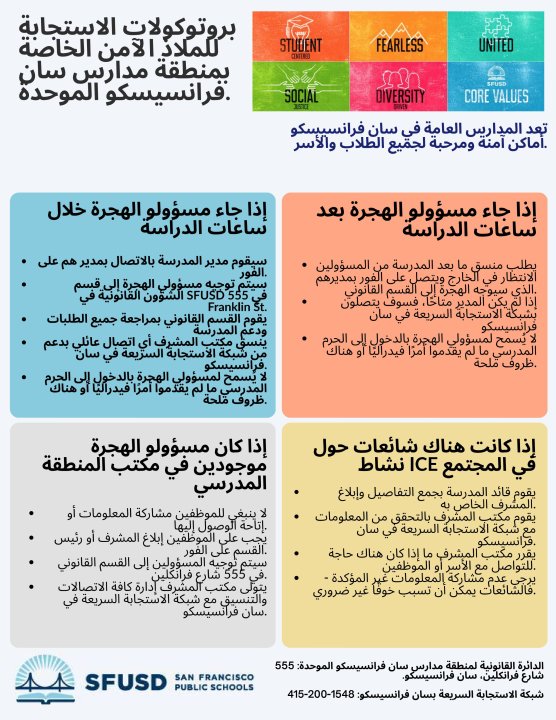
Sanctuary District in a Sanctuary City and State
Link to this section
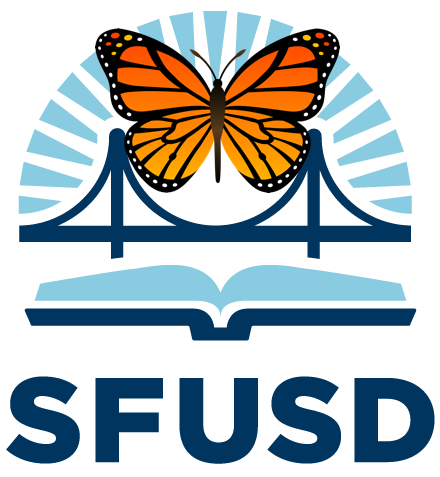
California, San Francisco, and SFUSD are and will always be sanctuaries committed to standing up for immigrant communities. We want all of our students, caregivers, and staff to be prepared and know their rights.
Find immigrant resources in San Francisco at sf.gov/immigrants

Rights of Undocumented Students
The San Francisco Unified School District is a safe haven for all students regardless of citizenship status. Every student has the right to attend school regardless of the immigration status of the child or of the child’s family members. All students, if they meet the federal and state criteria, are entitled to receive school services including free/reduced price school meals, transportation and other educational services. More information is included in the Student and Family Handbook under Chapter 3.6.6.
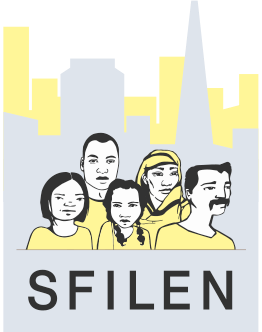
Know Your Rights and Family Emergency Toolkit
The San Francisco Immigrant Legal and Education Network website offers resources regarding constitutional rights and engaging with law enforcement as well as support for families in creating a plan in case of detention and/or deportation.

Legal Consults
If you are concerned about possible interactions with immigration officials, please consult with an attorney. Legal Service Providers:
- San Francisco Immigrant Legal and Education Network includes community based legal services.
- San Francisco specific online immigration portal provides information and access to legal resources.
- National Online Tool can help you determine if you qualify for immigration relief.
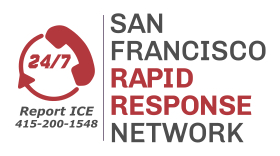
The San Francisco Rapid Response Network (SFRRN) is a collaboration between SFILEN and SFILDC. In response to heightened enforcement actions by Immigration and Customs Enforcement (ICE), SFRRN's system includes the following:
- 24 Hour Hotline. The number is 415-200-1548 with languages in Spanish, Arabic, and Chinese (both Cantonese and Mandarin).
- Raid Verification to make sure the immigration activity actually occurred, dispel myths, and lessen fear.
- Attorney Activation for individuals who are detained by immigration officials.
Frequently Asked Questions (FAQs)
Link to this section
These Frequently Asked Questions (FAQs) are intended to support students and families in SFUSD.
What happens if an immigration officer arrives on a school campus during the school day?
- Immigration officials shall be redirected to the SFUSD Legal Office at 555 Franklin St. to seek approval for access to a school site for any purpose.
- If the officer doesn’t leave, they will be escorted to the front office and an administrator will be notified. The officer will NOT be provided with information about students or families or offered access to campus except to the front office.
- The site administrator will get clarification about the purpose of the officer’s visit and contact the SFUSD Legal Office.
- The district will not give access to students or student information except when mandated pursuant to a valid warrant or court order signed by a federal or state judge, or if the officer declares that exigent circumstances necessitate immediate action. (Board Policy 5145.10)
What happens if an immigration officer shows up at a school event before 8 a.m. or after 5 p.m.?
The site administrator will be contacted. If a site administrator is not on site, staff will contact the SF Rapid Response Network 24-Hour Hotline at (415) 200-1548. The network may send a responder or an attorney to the site. The student’s caregiver will be informed by site staff or after-school staff.
What if I hear a rumor that immigration officers are in our school's neighborhood?
If you or someone you know observes an individual in your school’s neighborhood who is believed to be an immigration officer, contact the SF Rapid Response Network 24-Hour Hotline at (415) 200-1548. To help verify your observations, please provide a video or photos.
If I’m worried about immigration officers taking my student from their school, can I keep my child at home?
SFUSD staff, teachers, and administrators are trained on what to do if an official comes to the school. If there is a safety issue or possibility of disruption, staff will keep students in class until the area is cleared and safe for students.
All youth and children in San Francisco have a constitutional right to receive a public education. We will do everything within our power to ensure your child's rights are preserved. It is important for children to maintain their routines during challenging times, and if you are concerned about your child's well-being, please reach out to your school site principal or teacher.
What if I am not able to pick up my student from school due to an immigration issue on my part?
Your student’s school will contact all numbers on the student’s emergency card to identify a relative or caregiver authorized to take care of the student in the parents’ absence. So please make sure that your student’s emergency card is up to date and includes as many trusted adults as possible. Alternatively, the school can release the student into the custody of an adult who presents a Caregiver's Authorization Affidavit on behalf of the student. If no one is able to pick up your child, Child Protective Services will be contacted.
What can I do to prepare my family in case of an emergency or separation?
Here are resources that will help you and your family prepare:
- ILRC's Family Preparedness Toolkit: Lengthy explanation of detention/deportation planning (Chinese, English, Spanish)
- SFILEN's Family Emergency Plans: Printable booklet with information and fillable forms for families to complete with important personal information in case of emergency or separation (Arabic, Chinese, English, Filipino, Spanish)
Here are some key things to remember:
- If you or anyone you know is detained by ICE in San Francisco, call the Rapid Response 24-Hour Network Hotline: (415) 200-1548.
- Have a plan to take care of your children if you are detained. Make a plan with an adult family member or friend with legal authorization to be in the United States who you can contact in an emergency to take care of your child. As soon as you can, ask the ICE agent to let you call that person to take care of your child.
- Have the number of an immigration attorney with you. There is no right to a free attorney unless you are charged with a crime. There are organizations that can help you find low-cost or free immigration attorneys.
Avoid fraud! Take steps to ensure the person you're working with is allowed to practice law.
- City of San Francisco Immigrant Support website
- Bar Association of San Francisco: (415) 989-1616
- SF Rapid Response Network: (415) 200-1548
Locating a Person in the Custody of the Immigration Service Contact SF Rapid Response Network: (415) 200-1548 | |
San Francisco Immigration and Customs Enforcement (ICE) Field Office 630 Sansome Street, Rm 590 San Francisco, CA 94111 Phone: 415-844-5512 | To find out when a person in immigration custody will have their next hearing if one is scheduled, call 1-800-898-7180. |
For other ICE local offices, search http://www.ice.gov/about/dro/contact.htm or contact the headquarters at 202-305-2734 to get the number for the local office. | |
SFUSD Refugee and Immigrant Solidarity in Education (RISE-SF) Link to this section
 Newcomer Programming
Newcomer Programming
Newly arrived refugee and immigrant English Language Learners have particular educational strengths and challenges that necessitate specific support and programming. RISE-SF supports schools in implementing promising practices for this community.
Sanctuary Education Link to this section
As a sanctuary school district, SFUSD upholds every young person’s constitutional right to feel safe and supported in school. RISE-SF supports schools in ensuring their communities are aware of their rights and prepared to defend them. Here are sanctuary resources for families in multiple languages.
Contacts Link to this section
For more information about RISE-SF, please go to their webpage.
Update on Public Charge Rules for Immigrants Link to this section
On September 9, 2022, the US Citizenship and Immigration Services published a final rule on public charge effective December 23, 2022.
The new rule essentially codifies the 1999 guidance, with some added details and protections, strengthening the public charge guidance that we have had for more than two decades. At this time, the 1999 guidance is in effect. Under both current policy and the new rule once it goes into effect, it is safe for immigrants and their families to use health, nutrition, and housing programs for which they qualify. Health care programs, including Medicaid and COVID care, housing, food programs, and many other vital services are safe to use. - Immigrant Legal Resource Center (ILRC)
For more information on the public charge rules, review ILRC's latest update. Additional resources are available on the PIF Coalition and Keep Your Benefits webpages.
Deferred Action for Childhood Arrivals Program (DACA) Link to this section
DACA was created in 2012 to give some undocumented immigrants who came to the U.S. as children temporary protection from deportation and access to a work permit.
On Aug. 30, 2022, the Department of Homeland Security (DHS) published regulations preserving and fortifying the Deferred Action for Childhood Arrivals (DACA) policy. The final rule, effective Oct. 31, 2022, maintains the current threshold criteria for DACA applicants, retains the current process for work authorization for DACA applicants, and affirms the DHS policy that DACA does not provide a lawful status but allows DACA applicants to be considered “lawfully present” for certain purposes.
Due to the partial stay of the July 16, 2021 injunction from the U.S. District Court for the Southern District of Texas, DHS is prevented from applying the final rule to new initial DACA requests but can continue to grant renewal requests under this final rule.
- For more information on the DACA requirements, go to the Immigrant and Legal Resource Center's DACA page.
- For a list of all SF-based providers who will provide DACA application services for free, go to Office of Civic Engagement and Immigrant Affairs' (OCEIA) DACA webpage.
- For DACA fee assistance, review information at Mission Asset Fund
- For current and former SFUSD students, access free transcript records by emailing transcripts@sfusd.edu. More transcript information.
Request an Interpreter Link to this section
SFUSD school staff, including teachers, have access to simultaneous phone interpreters through Language Line. Please ask teachers and staff for a Language Line interpreter if you need one.
This page was last updated on January 22, 2026

